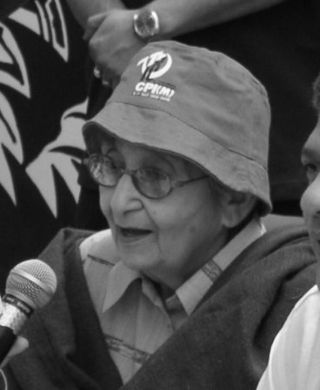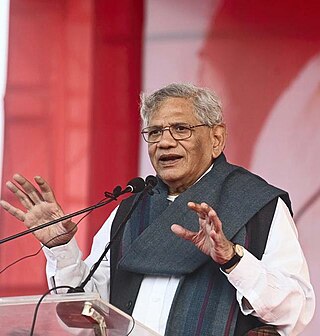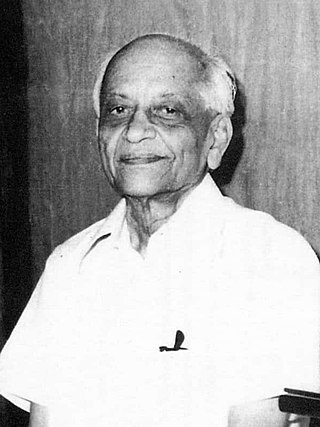
Mallika Sarabhai is an activist and Indian classical dancer and actress from Ahmedabad, Gujarat, India. Daughter of a classical dancer Mrinalini Sarabhai and space scientist Vikram Sarabhai, Mallika is an accomplished Kuchipudi and Bharatanatyam dancer and performer who has specialized in using the arts for social change and transformation.

Lakshmi Sahgal was a revolutionary of the Indian independence movement, an officer of the Indian National Army, and the Minister of Women's Affairs in the Azad Hind government. Lakshmi is commonly referred to in India as Captain Lakshmi, a reference to her rank when taken prisoner in Burma during the Second World War.

The Communist Party of India (CPI) is the oldest communist party in India. The CPI was founded in modern-day Kanpur on 26 December 1925.

Harkishan Singh Surjeet was an Indian Communist politician from Punjab, who served as the General Secretary of the Communist Party of India (Marxist) from 1992 to 2005 and was a member of the party's Polit Bureau from 1964 to 2008.
All India Democratic Women's Association (AIDWA) is a women's organisation committed to achieving democracy, equality and women's emancipation. It has an organizational presence in 23 states in India, with a current membership of more than 11 million. About two-thirds of the organisation's strength is derived from poor rural and urban women. It was founded in 1981 as a national level mass organisation of women. It is also the women's wing of the Communist Party of India (Marxist).

Prakash Karat is an Indian Communist politician. He was the general secretary of the Communist Party of India (Marxist) from 2005 to 2015.

Brinda Karat is an Indian marxist politician, and former member of Rajya Sabha as a Communist Party of India (Marxist) member, from 11 April 2005 to 2011 for West Bengal.
Shaad Ali is an Indian film director and screenwriter

Sitaram Yechury is an Indian Marxist politician and the General Secretary of the Communist Party of India (Marxist), and a member of the Politburo of the CPI(M) since 1992. Previously, he was a Member of Parliament, Rajya Sabha from West Bengal from 2005 to 2017.

Welham Girls' School is a private boarding school for girls located in Dehradun, Uttarakhand, India.
Susheela Gopalan was an Indian Communist leader and one of the founding members of the Communist Party of India (Marxist).

Muzaffar Ahmad was an Indian-Bengali politician, journalist and a co-founder of the Communist Party of India.

Lieutenant colonel Prem Kumar Sahgal was an officer of the British Indian Army. After becoming a Japanese prisoner of war, he served as an officer in the Indian National Army, which was led by Subhas Chandra Bose and had been set up by the Japanese to fight against British rule in India.

Shripad Amrit Dange was an Indian politician who was a founding member of the Communist Party of India (CPI) and a stalwart of Indian trade union movement. During the 20th century, Dange was arrested by the authorities for communist and trade union activities and was jailed for an overall period of 13 years.
Shaukat Usmani (Maulla Bux Usta) (1901–1978) was an early Indian communist, who was born to artistic USTA family of Bikaner and a member of the émigré Communist Party of India (Tashkent group), established in Tashkent in 1920, and a founding member of the Communist Party of India (CPI) formed in Kanpur in 1925. He was also the only candidate to the British Parliament contesting elections, while he was residing in India—that too in a prison. He was sentenced to a total of 16 years in jail after being tried in the Kanpur (Cawnpore) Case of 1923 and later the Meerut Conspiracy Case of 1929.
Ajoy Kumar Ghosh was an Indian freedom fighter and prominent leader of the Communist Party of India. He was the general secretary of the Communist Party of India from 1954 to 1962.

Saroj Mukherjee was an Indian freedom fighter and a member of the Polit Bureau of the Communist Party of India (Marxist). He was also the secretary of the West Bengal state committee of the Communist party.

Samar Mukherjee was an Indian Communist leader. who served as member of the Lok Sabha, the lower house of the Parliament of India for the Howrah constituency for three consecutive term, and as a member of the Rajya Sabha. He was a member of the Polit Bureau, member of the Central Committee of Communist Party of India (Marxist) and he was also the General Secretary CITU.

The Politburo or Polit Bureau is the highest body of the Communist Party of India (Marxist). The members of the Politburo are elected by the Central Committee in the immediate aftermath of a National Party Congress, which is held every three years.

The Communist Party of India is one of the oldest political parties in India. However within the Indian communist movement, there is a controversy on what date to consider as the foundation date of the party. The early history of the Indian communist movement was tumultuous and complicated. An Indian communist group emerged in Tashkent in 1920, led by M. N. Roy. From 1921 onward small local communist groups began to emerge inside India. A national communist conference was held in Kanpur in 1925. The efforts to build a Communist Party organization inside India were hampered by arrests and court cases against leading party members.
















